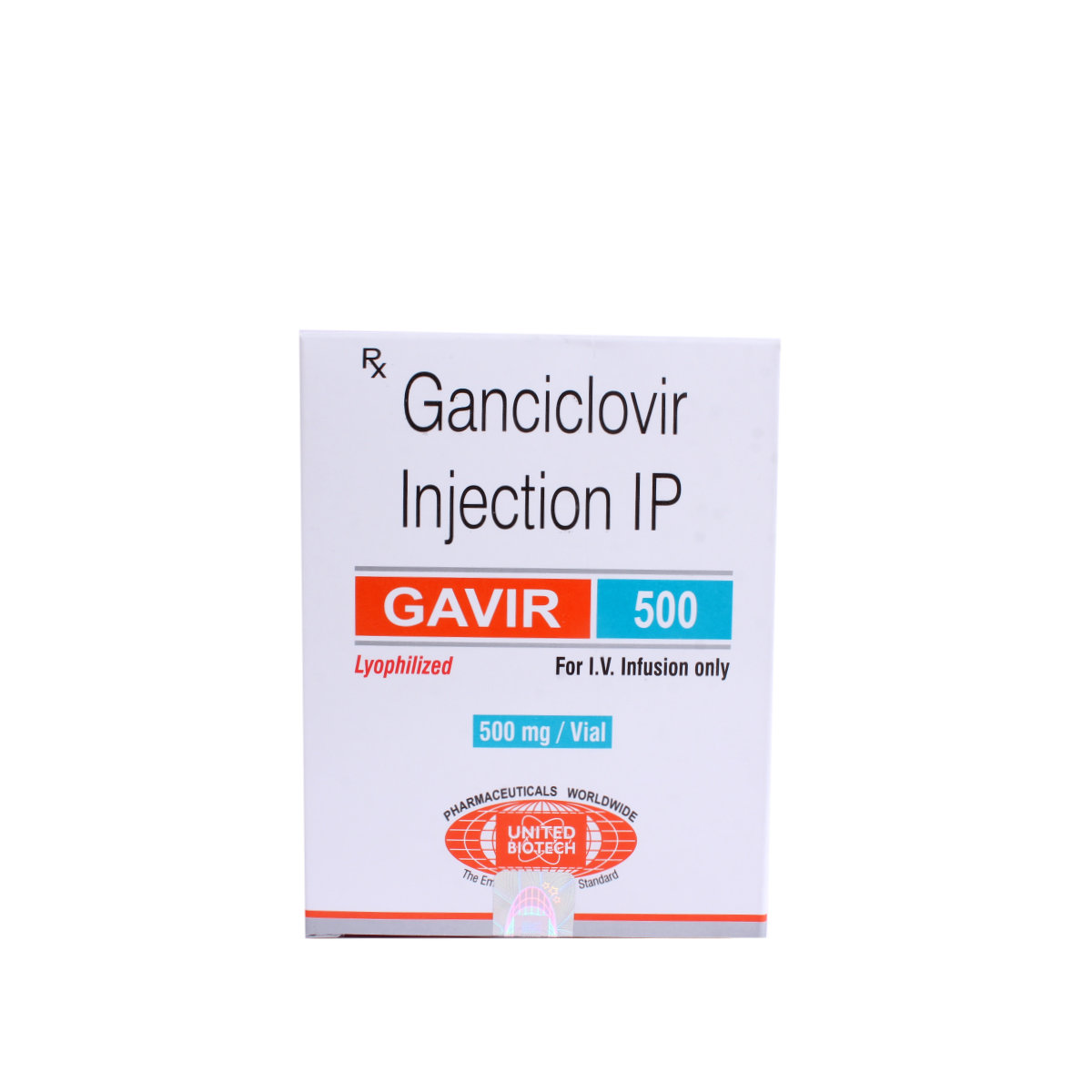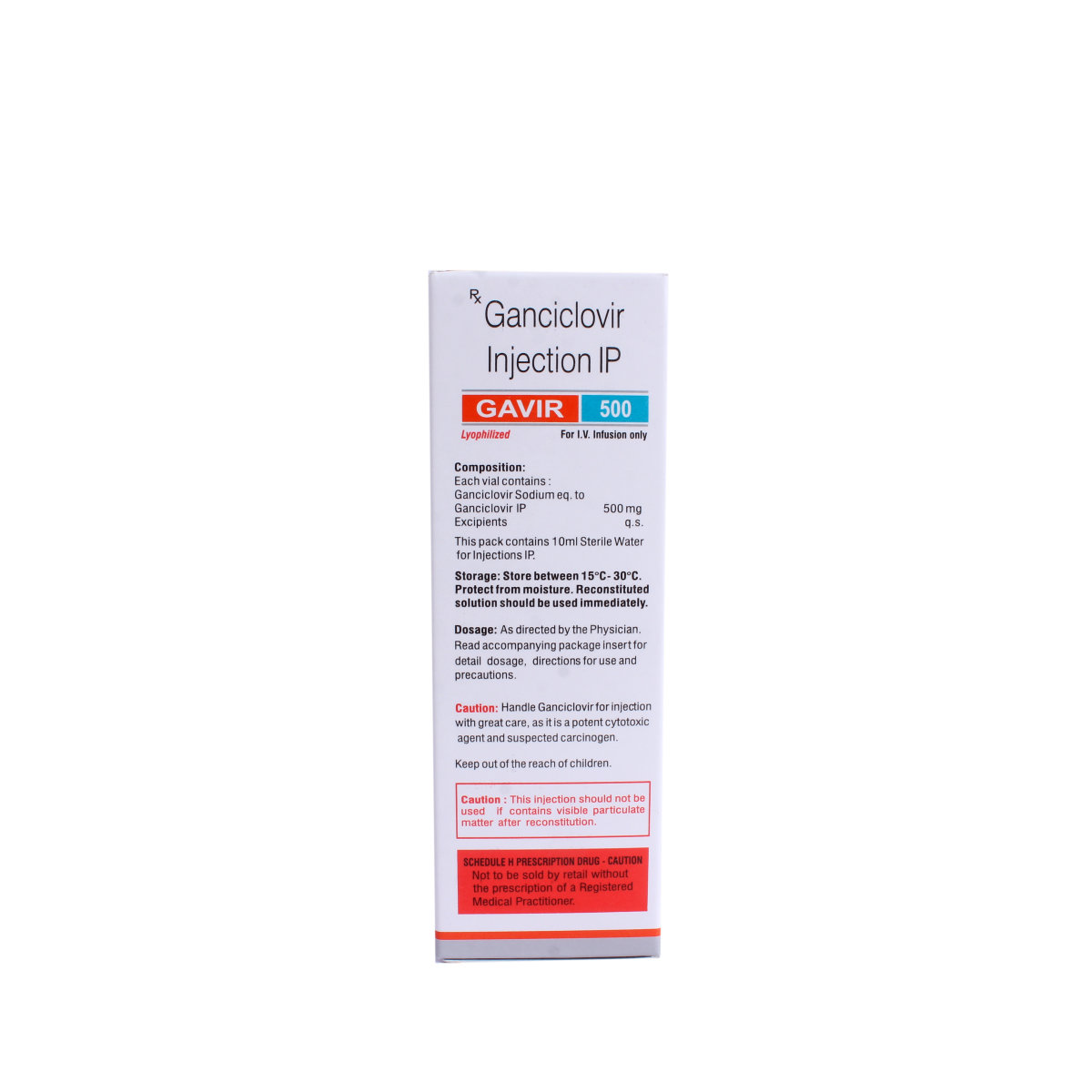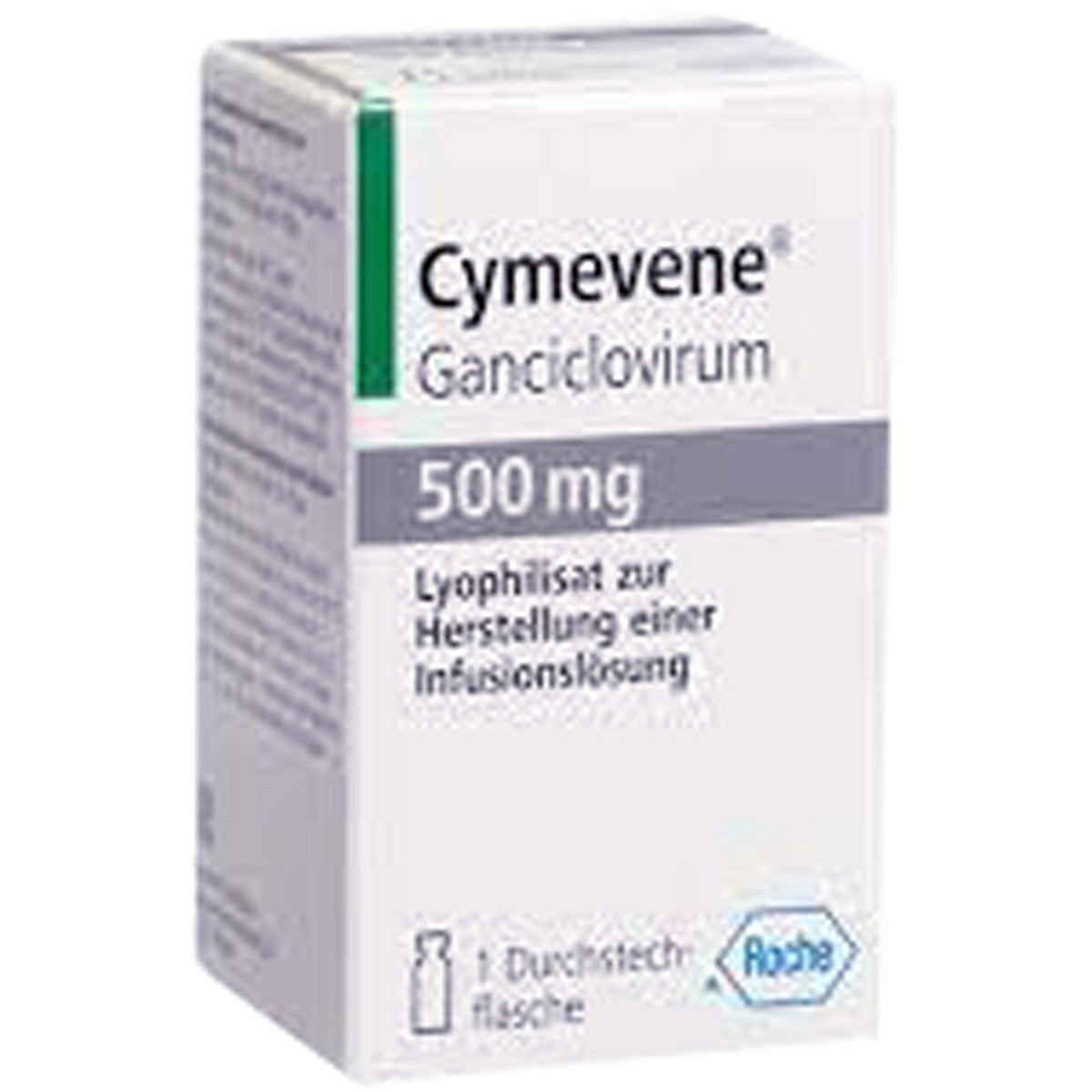Gavir 500 Injection 1's
MRP ₹2225
(Inclusive of all Taxes)
₹333.8 Cashback (15%)
Provide Delivery Location
Online payment accepted
 Prescription drug
Prescription drugWhats That
Composition :
Manufacturer/Marketer :
Consume Type :
Expires on or after :
Return Policy :
About Gavir 500 Injection
Gavir 500 Injection belongs to the class of 'antivirals' used in the treatment of cytomegalovirus (CMV) retinitis. Cytomegalovirus (CMV) retinitis is an infection that affects the retina of the eye caused by a virus called Cytomegalovirus (CMV), especially in AIDS patients. It is a serious infection that can lead to blindness. Gavir 500 Injection is also used to prevent Cytomegalovirus disease in transplant patients who are at risk for CMV infection.
Gavir 500 Injection contains Ganciclovir, which works by killing and stopping the growth of the cytomegalovirus. Thus, helps to treat Cytomegalovirus (CMV) retinitis.
Gavir 500 Injection is a parenteral preparation. It will be administered by a healthcare professional; hence do not self-administer. Common side effects of Gavir 500 Injection may include nausea, vomiting, loss of appetite, itching, sensitivity to light (photosensitivity), swelling, redness and tenderness at the injection site. These side effects may not occur in every patient using this medication and gradually resolve over time. If the side effects persist longer or worsen, please inform your doctor.
Let your doctor know if you are allergic to any medications. Inform your doctor if you have a weakened immune system, breathing problems, an electrolyte imbalance, blood disorders, and liver or kidney diseases before starting Gavir 500 Injection. Gavir 500 Injection is not recommended for use in pregnant and breastfeeding women. Hence, inform your doctor before starting Gavir 500 Injection. Avoid alcohol consumption while on treatment with Gavir 500 Injection to enable your body to fight off infections. Gavir 500 Injection should be avoided in children as the safety and efficacy are not explained.
Uses of Gavir 500 Injection
Directions for Use
Key Benefits
Gavir 500 Injection treats viral infection of the eye caused by Cytomegalovirus (CMV) retinitis. It is also used to treat Cytomegalovirus disease in transplant patients. Gavir 500 Injection consists of Gancyclovir, an antiviral drug that works by killing and stopping the growth of the herpes simplex virus on the cornea.
Storage
- Talk to your doctor about medicines to manage neutropenia based on the underlying cause.
- Avoid contact with people who are sick.
- Wash your hands regularly with soap and water.
- Avoid unpasteurized dairy products.
- Include iron-rich foods like dark leafy vegetables, lean red meat, legumes and fish in your diet.
- Consume vitamin C-rich foods as they aid iron absorption.
- Limit tea, cocoa, and coffee as these can slow iron absorption.
- Exercise regularly; however, do not overdo it.
- Consume more protein-rich foods and healthy fats like beans, avocados, cheese, nuts and lean meats to minimize appetite.
- Prefer foods high in fiber to help feel full for a long time.
- If you have decreased appetite, eat only when you are hungry.
- Eat several small meals or snacks all day.
- Try to take only small sips of fluids while eating.
- Hydrate your body: Drink enough water to prevent dehydration and headaches.
- Calm Your Mind: Deep breathing and meditation can help you relax and relieve stress.
- Rest and Recharge: Sleep for 7-8 hours to reduce headache triggers.
- Take rest: lie down in a quiet, dark environment.
- Cold or warm compresses can help reduce tension.
- Stay Upright: Maintain good posture to keep symptoms from getting worse.
- To treat headaches naturally, try acupuncture or massage therapy.
- Over-the-counter pain relievers include acetaminophen and ibuprofen.
- Prescription Assistance: Speak with your doctor about more substantial drug alternatives.
- Severe Headaches: Seek emergency medical assistance for sudden, severe headaches.
- Frequent Headaches: If you get reoccurring headaches, consult your doctor.
- Headaches with Symptoms: Seek medical attention if your headaches include fever, disorientation, or weakness.
- Tell your doctor about the cough symptoms you're experiencing, which may be triggered by your medication.
- Your doctor may adjust your treatment plan by changing your medication, adding new medications, or providing guidance on managing your cough symptoms.
- Practice good hygiene, including frequent handwashing, avoiding close contact with others, and avoiding sharing utensils or personal items.
- Stay hydrated by drinking plenty of fluids, such as water, tea, or soup, to help thin out mucus and soothe your throat.
- Get plenty of rest and engage in stress-reducing activities to help your body recover. If your cough persists or worsens, consult your doctor for further guidance.
- Inform Your Doctor: Notify your doctor immediately about your diarrhoea symptoms. This allows them to adjust your medication or provide guidance on managing side effects.
- Stay Hydrated: Drink plenty of fluids to replace lost water and electrolytes. Choose water, clear broth, and electrolyte-rich drinks. Avoid carbonated or caffeinated beverages to effectively rehydrate your body.
- Follow a Bland Diet: Eat easy-to-digest foods to help firm up your stool and settle your stomach. Try incorporating bananas, rice, applesauce, toast, plain crackers, and boiled vegetables into your diet.
- Avoid Trigger Foods: Steer clear of foods that can worsen diarrhoea, such as spicy, fatty, or greasy foods, high-fibre foods, and dairy products (especially if you're lactose intolerant).
- Practice Good Hygiene: Maintain good hygiene to prevent the spread of infection. To stay healthy, wash your hands frequently, clean and disinfect surfaces regularly, and avoid exchanging personal belongings with others.
- Take Anti-Diarrheal Medications: If your doctor advises, anti-diarrheal medications such as loperamide might help manage diarrhoea symptoms. Always follow your doctor's directions.
- Keep track of your diarrhoea symptoms. If they don't get better or worse or are accompanied by severe stomach pain, blood, or dehydration signs (like extreme thirst or dark urine), seek medical help.
- Inform your doctor about the nausea and discuss possible alternatives to the medication or adjustments to the dosage.
- Divide your daily food intake into smaller, more frequent meals to reduce nausea.
- Opt for bland, easily digestible foods like crackers, toast, plain rice, bananas, and applesauce.
- Avoid certain foods that can trigger nausea, such as fatty, greasy, spicy, and smelly foods.
- Drink plenty of fluids, such as water, clear broth, or electrolyte-rich beverages like coconut water or sports drinks.
- Use ginger (tea, ale, or candies) to help relieve nausea.
- Get adequate rest and also avoid strenuous activities that can worsen nausea.
- Talk to your doctor about taking anti-nausea medication if your nausea is severe.
- Record when your nausea occurs, what triggers it, and what provides relief to help you identify patterns and manage your symptoms more effectively.
Drug Warnings
Inform your doctor if you are allergic to Gavir 500 Injection or any of the components in Gavir 500 Injection. It is advised to inform your doctor that you are pregnant or planning a pregnancy as Gavir 500 Injection may cause infertility problems and fetal toxicity. Patients with kidney disease should avoid receiving a name and should notify their doctor. Before beginning treatment with Gavir 500 Injection, inform your doctor if you have a history of cancer disease. Nursing mothers should avoid breastfeeding while receiving Gavir 500 Injection as it passes in breastmilk and cause side effects to infants.
Drug-Drug Interactions
Drug-Drug Interactions
Login/Sign Up
Coadministration of cidofovir with Gavir 500 Injection can increase the risk of kidney problems.
How to manage the interaction:
Although there is a interaction between Gavir 500 Injection and Cidofovir hence it is not recommended to be taken together, but it can be taken only if advised by a doctor. However, if you experience nausea, vomiting, loss of appetite, increased or decreased urination, sudden weight gain or loss, fluid retention, swelling, shortness of breath, muscle cramps, tiredness, weakness, dizziness, confusion, or an irregular heart rhythm, consult a doctor. Do not discontinue any medications without consulting a doctor.
Using zidovudine together with Gavir 500 Injection may increase the risk of side effects affecting the blood leading to decreased levels of blood cells.
How to manage the interaction:
Taking Gavir 500 Injection with zidovudine together can possibly result in an interaction, it can be taken if your doctor has advised it. However, if you notice any symptoms of fever, chills, sore throat, rashes, tiredness, headaches, irritation, confusion, edema, fatigue, palpitations, or constipation, you should contact a doctor immediately. Do not stop using any medications without talking to a doctor.
Combining Infliximab with Gavir 500 Injection can increase the risk or severity of developing serious infections.
How to manage the interaction:
There may be a possibility of interaction between Gavir 500 Injection and Infliximab, but it can be taken if prescribed by a doctor. If you have any of these symptom's fever, chills, diarrhea, sore throat, muscle aches, difficulty breathing, weight loss, and pain or burning when you urinate contact your doctor immediately. Don't hesitate to reach out to a doctor if you experience any of these. Do not stop using any medications without a doctor's advice.
Coadministration of Gavir 500 Injection with Maribavir may alter the effectiveness of both these medications. This can lead to low treatment outcomes.
How to manage the interaction:
Taking Maribavir and Gavir 500 Injection together can possibly result in an interaction; it can be taken if your doctor has advised it. Do not stop using any medications without talking to your doctor.
Using Gavir 500 Injection together with certolizumab may increase the risk of serious infections.
How to manage the interaction:
Taking Gavir 500 Injection with certolizumab together can result in an interaction, it can be taken if your doctor has advised it. However, if you experience fever, chills, diarrhea, sore throat, muscle aches, shortness of breath, blood in phlegm, weight loss, red or inflamed skin, body sores, and pain or burning during urination, contact a doctor immediately. Do not discontinue any medications without consulting a doctor.
Clozapine can cause higher levels of Gavir 500 Injection in the blood by reducing its excretion rate. This can increase the risk or severity of side effects.
How to manage the interaction:
Although there is a possible interaction between Gavir 500 Injection and Clozapine, you can take these medicines together if prescribed by a doctor. If you're having any of these symptoms like fever, chills, diarrhea, sore throat, muscle aches, breathing difficulty, weight loss, or pain, it's important to contact a doctor right away. Do not stop using any medications without talking to a doctor.
Taking cladribine together with Gavir 500 Injection may increase the risk of serious infections.
How to manage the interaction:
Co-administration of Cladribine with Gavir 500 Injection can result in an interaction, but it can be taken if your doctor has advised it. If you have any symptoms like fever, chills, diarrhea, sore throat, muscle aches, difficulty breathing, weight loss, pain, or burning while peeing make sure to contact a doctor right away. Do not stop using any medications without talking to a doctor.
Using Gavir 500 Injection together with adalimumab may increase the risk of serious infections.
How to manage the interaction:
Taking Gavir 500 Injection with adalimumab together can result in an interaction, it can be taken if your doctor has advised it. However, if you experience fever, chills, diarrhea, sore throat, muscle aches, shortness of breath, blood in phlegm, weight loss, red or inflamed skin, body sores, and pain or burning during urination, contact a doctor immediately. Do not discontinue any medications without consulting a doctor.
Using Gavir 500 Injection together with golimumab may increase the risk of serious infections.
How to manage the interaction:
Although there is a possible interaction between Gavir 500 Injection and Golimumab, you can take these medicines together if prescribed by your doctor. If you have any of these symptoms like fever, chills, diarrhea, a sore throat, muscle pain, difficulty breathing, weight loss, and pain or burning when you pee contact a doctor immediately. Do not stop using any medications without a doctor's advice.
Gavir 500 Injection can cause higher levels of Deferiprone in the blood by reducing its excretion rate. This can increase the risk or severity of side effects.
How to manage the interaction:
Although taking Gavir 500 Injection and Deferiprone together can evidently cause an interaction, it can be taken if your doctor has suggested it. If you're having any of these symptoms - like a sore throat, fever, or muscle aches - it's important to let a doctor know right away. Do not stop using any medications without a doctor's advice.
Drug-Food Interactions
Drug-Food Interactions
Login/Sign Up
Diet & Lifestyle Advise
- Manage stress, eat healthily, drink plenty of water, exercise regularly, and get plenty of sleep.
- Eat foods rich in antioxidants such as berries, spinach, kidney beans, dark chocolate, etc.
- Know your allergy triggers, such as pollen, dust and other factors.
- Do not rub your eyes even though some ophthalmic drugs make your eye itchy.
Side Effects of Gavir 500 Injection
- Nausea
- Vomiting
- Photosensitivity
- Diarrhea
- Loss of appetite
- Tiredness
- Sweating
- Redness
- Pain
- Injection site reactions
Habit Forming
Therapeutic Class
All Substitutes & Brand Comparisons
RX
NATCLOVIR 500MG VAIL INJECTION 10ML
Natco Pharma Ltd
₹1563
(₹137.54/ 1ml)
93% CHEAPERRX
Out of StockCymevene 500mg Injection 1's
₹2380.5
(₹2142.5 per unit)
6% COSTLIER
Author Details
We provide you with authentic, trustworthy and relevant information
Drug-Diseases Interactions
Drug-Diseases Interactions
Login/Sign Up
FAQs
Drug-Drug Interactions Checker List
- DIDANOSINE
- PROBENECID
- ZIDOVUDINE
- CYCLOSPORINE
- AMPHOTERICIN B
- IMIPENEM
Special Advise
Disease/Condition Glossary
Cytomegalovirus (CMV) retinitis: This is an eye infection caused when Cytomegalovirus (CMV) affects the retina (light-sensing nerve layer) of the eye, which can lead to blindness. It mainly occurs in weak immune patients, such as AIDS (Acquired immune deficiency syndrome). Symptoms include eye pain, tearing, redness, blurred vision, blind spots and visual disturbances.
Cytomegalovirus disease: It mainly occurs in people with weak immune systems. Gavir 500 Injection is used in the treatment of cytomegalovirus (CMV) disease in transplant patients.

Have a query?
Alcohol
Safe if prescribed
There is limited information on how alcohol consumption affects Gavir 500 Injection. Please consult your doctor.
Pregnancy
Consult your doctor
Gavir 500 Injection may cause fetal toxicity and Impairment of Fertility in males and females. Hence, inform your doctor if you are pregnant before receiving Gavir 500 Injection.
Breast Feeding
Consult your doctor
Gavir 500 Injection is not recommended for use in nursing mothers as it can cause serious side effects to newborn infants. Hence, inform your doctor if you are breastfeeding before receiving this medicine.
Driving
Safe if prescribed
Gavir 500 Injection causes sleepiness and drowsiness. Do not drive or operate machinery that requires metal alertness.
Liver
Consult your doctor
Inform your doctor if you have any history of liver diseases or hepatic impairment before receiving Gavir 500 Injection. Your doctor will advise this medicine only if the benefits outweigh the risks.
Kidney
Consult your doctor
Gavir 500 Injection is known to cause kidney or renal problems. Hence, inform your doctor if you have any history of kidney diseases before receiving Gavir 500 Injection as it can cause serious side effects.
Children
Safe if prescribed
The use of Gavir 500 Injection is not recommended for children below 16 years of age as the safety and efficacy data are not established.










.jpg?tr=q-85)

